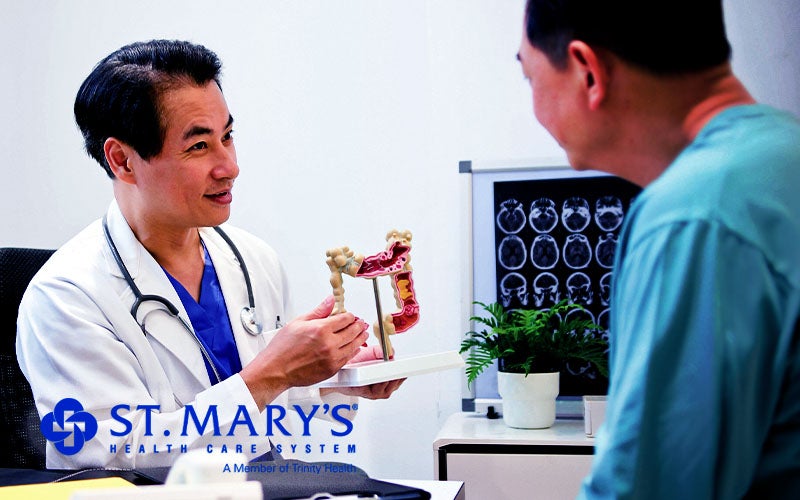Be aware: Colorectal cancer screening saves lives
April 10, 2024
By: McKenzie Chapman
Categories: Healthy Living
Getting Screened Starting at Age 45 Can Significantly Reduce Your Risk
Colorectal cancer is a killer. In the United States, colorectal cancer ranks as the third-leading cause of cancer-related deaths among men and the fourth among women. Overall, the risk of developing colorectal cancer in one's lifetime is about 1 in 23 for men and 1 in 25 for women, and approximately 53,010 deaths are expected from the disease in 2024.
What is colorectal cancer and what are the risk factors?
Colorectal cancer is caused by the uncontrolled growth of cells in the colon or rectum and is often referred to as colon cancer. The colon, or large intestine, and the rectum, which links the colon to the anus, are the primary areas where this disease occurs.
Colorectal cancer develops from polyps, which are abnormal growths in the colon or rectum that can develop over time. Some polyps have the potential to progress into cancer. Your risk of getting colorectal cancer increases as you get older, but some other risk factors include:
- Family history of colorectal cancer or colorectal polyps.
- Inflammatory bowel disease such as Crohn’s disease or ulcerative colitis.
- A low-fiber and high-fat diet, or a diet high in processed meats.
- Overweight and obesity.
- Tobacco use.
- Alcohol consumption.
How can I prevent colorectal cancer?
Getting screened for colorectal cancer routinely is the most effective method to reduce your risk of developing the disease. The American Cancer Society recommends screening should begin at age 45, but people with high-risk factors should talk to their doctor sooner and see a doctor immediately if symptoms develop. Additionally, it is important to remember that you should consume a healthy diet rich in fiber and low in fat.
Research suggests that people may reduce their risk of developing colorectal cancer by increasing physical activity, keeping a healthy weight, limiting alcohol consumption, and avoiding tobacco.
Each year, we observe Colorectal Cancer Awareness Month in March, but it's crucial to understand the significant impact of this disease all year long. Together, let's raise awareness, promote healthy lifestyles, and work towards reducing the burden of colorectal cancer in our communities.
What are the signs and symptoms of colorectal cancer?
According to the Centers for Disease Control and Prevention, here are the leading signs that mean you need to talk to your doctor about the possibility of colorectal cancer:
- A change in bowel habits
- Blood in your stool (bowel movement)
- Diarrhea, constipation, or feeling that the bowel does not empty all the way
- Abdominal pain, aches, or cramps that don’t go away
- Weight loss and you don’t know why.
Remember that colorectal cancer is most treatable in its early stages, often before symptoms appear. Symptoms may be caused by conditions other than cancer, but because cancer is so serious, you should make an appointment with a primary care provider immediately.
How do I know when to see a doctor about new bowel symptoms?
Better health begins with having a primary care provider (PCP) who knows you and your medical history. If you do not have a PCP, St. Mary’s can help. Our medical group includes numerous PCPs, many of whom are accepting new patients. Next-day and even same-day appointments may be available! Make your appointment now using our InQuicker online scheduling service.
When is a colonoscopy or surgery necessary?
A colonoscopy is the best way to screen for colorectal surgery and remove polyps for prevention and early diagnosis. The skilled and compassionate surgeons with Athens General and Colorectal Surgeons can perform colonoscopies and, when needed, surgical procedures that are vital for treating cancerous tissue. Learn more.
Do you need help developing a healthy diet?
St. Mary’s Medical Group's Nutrition Services provides a staff of registered dietitians to help patients meet their goals and nutritional requirements.
Clinical Nutrition Services include:
- Individual nutrition assessment and counseling for all age groups
- Individualized meal plans and disease self-management strategies
- Nutrient analysis
- Assessment of calorie needs; individualized weight management plans
- Assistance with diabetes self-management classes and counseling
If you have more questions, contact St. Mary's Outpatient Nutrition Services at (706) 389-3669 or click here to learn more.
